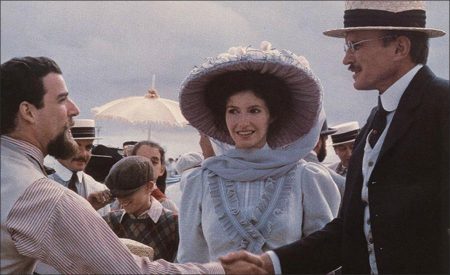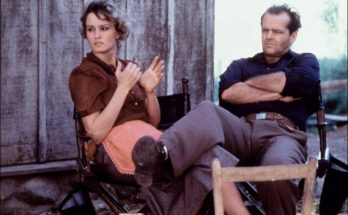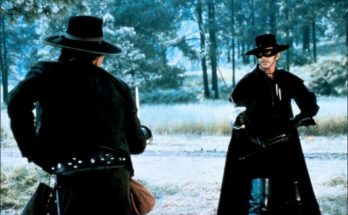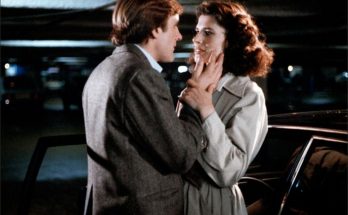Taglines: It was the best of times, it was the worst of times, it was Ragtime.
Ragtime begins with a newsreel montage, depicting celebrities of the turn of the 20th century such as Harry Houdini, Theodore Roosevelt and the architect Stanford White (Norman Mailer), as well as life in New York City. The newsreel is accompanied by ragtime pianist Coalhouse Walker, Jr. (Howard E. Rollins, Jr.).
The millionaire industrialist Harry Kendall Thaw (Robert Joy), who makes a scene when White’s latest creation, a nude statue on the roof of Madison Square Garden, is unveiled. The model for the statue is Evelyn Nesbit (Elizabeth McGovern), a former chorus girl who is now Thaw’s wife. Thaw becomes convinced White has corrupted Evelyn and humiliated him, and publicly shoots White, killing him.
An unnamed family resided in a comfortable suburban home in New Rochelle. The family’s Father (James Olson) owns a factory, where his wife’s Younger Brother (Brad Dourif) is employed as a fireworks maker. Their passive, sheltered existence is disturbed when an abandoned African American baby is found in their garden. The child’s mother, an unmarried washerwoman named Sarah (Debbie Allen), is discovered, and brought to their home.
When she learns that the police intend to charge Sarah with attempted murder, Mother (Mary Steenburgen) intervenes and takes Sarah and her child into the home, despite Father’s objections. Some time later, Coalhouse Walker arrives at the house in search of Sarah, driving a new model T Ford and acting in a brash manner unlike the subservient attitude expected of the African American community at the time. Realizing that he is the baby’s father, he announces to a skeptical Father that he intends to marry Sarah.
Younger Brother witnesses White’s murder and becomes obsessed with Evelyn, leaving home for long periods of time to follow her throughout the city. Thaw’s lawyer, Delphin (Pat O’Brien), bribes Evelyn with a million-dollar divorce settlement (which she accepts) to keep silent about Thaw’s mental instability at his trial and to testify that White had abused her. Passing through the tenements of the Lower East Side, Evelyn encounters a street artist known as Tateh (Mandy Patinkin) and witnesses him throw his wife (Fran Drescher) out of their home after learning of her infidelity.
He takes their daughter and leaves New York, taking with him the flip book he has invented, which he begins to sell successfully. Evelyn, who has become fond of the little girl, is troubled by their disappearance, but distracted when Younger Brother declares his love to her. She begins an affair with him as she begins to plan her return to the stage. He assumes that they will eventually marry and plans to introduce her to his family.
However, after Thaw is found not guilty by reason of temporary insanity, his lawyers interrupt one of Evelyn’s trysts with Younger Brother and inform her that Thaw will be suing her for divorce on the grounds of infidelity, offering her a much smaller divorce settlement, which she takes. The affair ends shortly thereafter, leaving Younger Brother adrift.
Ragtime is a 1981 American drama film, directed by Miloš Forman, based on 1975 historical novel Ragtime by E. L. Doctorow. The action takes place in and around New York City, New Rochelle, and Atlantic City early in the 1900s, including fictionalized references to actual people and events of the time.
The film features the final film appearances of James Cagney and Pat O’Brien; early appearances, in small parts, by Samuel L. Jackson, Jeff Daniels, Fran Drescher, Ethan Phillips and John Ratzenberger; and an uncredited appearance from Jack Nicholson. The music score was composed by Randy Newman. The film was nominated for eight Oscars.
Ragtime (1981)
Directed by: Milos Forman
Starring: James Cagney, Elizabeth McGovern, Howard E. Rollins Jr., Moses Gunn, Brad Dourif, Kenneth McMillan, Mandy Patinkin, Mary Steenburgen, Debbie Allen
Screenplay by: Michael Weller
Production Design by: John Graysmark
Cinematography by: Miroslav Ondrícek
Costume Design by: Anna Hill Johnstone
Art Direction by: John Dapper
Music by: Randy Newman
Distributed by: Paramount Pictures
Release Date: November 20, 1981
Views: 212








